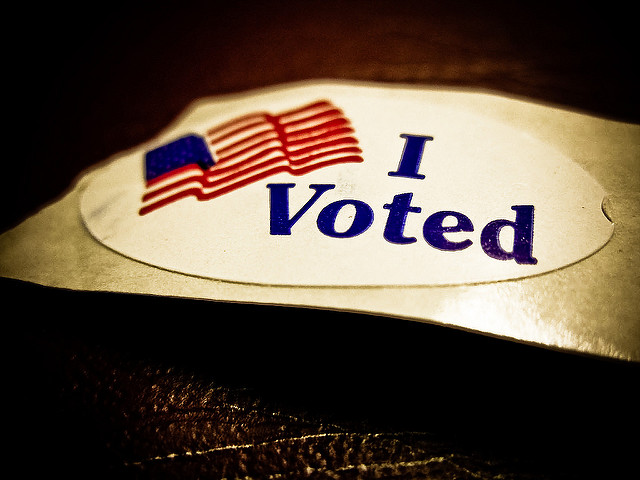Like this article? rabble is reader-supported journalism. Chip in to keep stories like these coming.
The Voting Rights Act, signed into law by President Lyndon Johnson on Aug. 6, 1965, helped enfranchise millions of African-Americans over the decades. Speaking before a bipartisan gathering of members of Congress, his Cabinet, civil-rights leaders and the press, Johnson said of African-Americans: “They came in darkness and they came in chains. And today we strike away the last major shackle of those fierce and ancient bonds.”
The Voting Rights Act was renewed and extended several times during the last half-century. Then, in June 2013, a divided U.S. Supreme Court, voting 5-4, gutted the law. Almost immediately, Southern states began passing restrictive voting laws, disenfranchising hundreds of thousands, if not millions, of voters. Three years later, however, this new generation of Jim Crow-style laws is facing federal court challenges, and they are being thrown out or significantly weakened, one by one.
The most recent, and perhaps most sweeping, of the court decisions came down last Friday in North Carolina. There, a controversial law signed by Republican Gov. Pat McCrory just weeks after the Supreme Court gutted the Voting Rights Act, eliminated many provisions of the state’s election laws that had extended the vote to many, mostly African-American North Carolinians. The law imposed a strict photo-identification requirement in order to vote. It did away with much of the state’s early voting, including Sunday voting, which is very important to the African-American community, as church congregations go together after services in what is called “souls to the polls.” The state eliminated countywide voting, allowing people to vote outside their specific precinct, and eliminated same-day registration and preregistration of 16- and 17-year-olds. All these were improvements to the state’s voter- enfranchisement laws that had been enacted when the state government was under Democratic control.
The appeals court wrote, “The new provisions target African Americans with almost surgical precision.” The judges found that the North Carolina Legislature and governor, under Republican control since early 2011, offered no proof of voter fraud — the primary Republican justification for enacting restrictive voting laws. Or as Republican presidential candidate Donald Trump warned with no evidence, “We may have people vote 10 times.”
This has become a principal electoral strategy of Republicans, especially since the election of President Barack Obama in 2008. Ari Berman, a writer for The Nation and author of the must-read book Give Us the Ballot: The Modern Struggle for Voting Rights in America, subtitled his most recent piece, summarizing the court decisions that are rejecting these restrictive voting laws, “The Republican war on voting rights is backfiring.” He writes about court victories for those challenging these laws in North Carolina, Wisconsin, Texas, Michigan, Ohio and Kansas.
Berman told us on the Democracy Now! news hour about Elizabeth Gholar, one person whose right to vote was denied:
“She’s an elderly woman who was born in Jim Crow North Carolina, and then she moved to Texas. She had a Louisiana driver’s license, which was not accepted as valid voter ID in Texas. And her birth certificate was not accepted as a valid form of ID to be able to get a government-issued ID in Texas. Because she was born at home to a midwife, she basically had to retain a lawyer to be able to get all her documentation in Louisiana. This was incredibly emotional. She testified in federal court and basically said: ‘I was born in Jim Crow before African-Americans were able to vote in Louisiana, and now I can’t vote again. For the first time in 60 years, I am not able to vote in the state of Texas, and this breaks my heart.'”
For people like Gholar, this new tide of disenfranchisement may be turning, but whether it happens in time for the November presidential election remains to be seen. As Berman notes:
“We’re less than 100 days from the election now, and this is the first presidential election in 50 years without the full protections of the Voting Rights Act. Seventeen states have new restrictions in place for the first time … it’s still a very uncertain situation.”
The North Carolina court decision, like the passage of the Voting Rights Act itself, was preceded by years of nonviolent protest. In 1965, the centre of activity was Selma, Alabama, where peaceful marchers were brutally attacked by state police as they crossed the Edmund Pettus Bridge, named for a Confederate general and Ku Klux Klan Grand Dragon. In North Carolina, the state NAACP chapter has organized thousands to engage in civil disobedience during its weekly “Moral Mondays” protests. Over half a century after the Voting Rights Act became law, the struggle continues.
Amy Goodman is the host of Democracy Now!, a daily international TV/radio news hour airing on more than 1,400 stations. She is the co-author, with Denis Moynihan and David Goodman, of the newly published New York Times bestseller Democracy Now!: 20 Years Covering the Movements Changing America. They are currently on a 100-city U.S. tour.
This column was first published on Truthdig.
Photo: Vox Efx/flickr
Like this article? rabble is reader-supported journalism. Chip in to keep stories like these coming.



